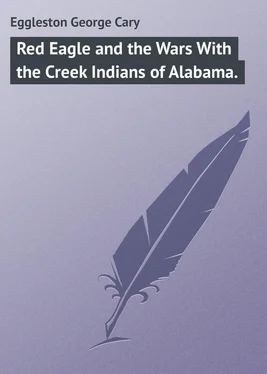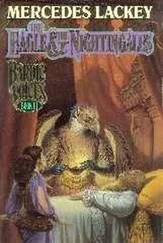George Eggleston - Red Eagle and the Wars With the Creek Indians of Alabama.
Здесь есть возможность читать онлайн «George Eggleston - Red Eagle and the Wars With the Creek Indians of Alabama.» — ознакомительный отрывок электронной книги совершенно бесплатно, а после прочтения отрывка купить полную версию. В некоторых случаях можно слушать аудио, скачать через торрент в формате fb2 и присутствует краткое содержание. Жанр: foreign_prose, на английском языке. Описание произведения, (предисловие) а так же отзывы посетителей доступны на портале библиотеки ЛибКат.
- Название:Red Eagle and the Wars With the Creek Indians of Alabama.
- Автор:
- Жанр:
- Год:неизвестен
- ISBN:нет данных
- Рейтинг книги:4 / 5. Голосов: 1
-
Избранное:Добавить в избранное
- Отзывы:
-
Ваша оценка:
- 80
- 1
- 2
- 3
- 4
- 5
Red Eagle and the Wars With the Creek Indians of Alabama.: краткое содержание, описание и аннотация
Предлагаем к чтению аннотацию, описание, краткое содержание или предисловие (зависит от того, что написал сам автор книги «Red Eagle and the Wars With the Creek Indians of Alabama.»). Если вы не нашли необходимую информацию о книге — напишите в комментариях, мы постараемся отыскать её.
Red Eagle and the Wars With the Creek Indians of Alabama. — читать онлайн ознакомительный отрывок
Ниже представлен текст книги, разбитый по страницам. Система сохранения места последней прочитанной страницы, позволяет с удобством читать онлайн бесплатно книгу «Red Eagle and the Wars With the Creek Indians of Alabama.», без необходимости каждый раз заново искать на чём Вы остановились. Поставьте закладку, и сможете в любой момент перейти на страницу, на которой закончили чтение.
Интервал:
Закладка:
Acting upon Red Eagle's hint, Tecumseh directed his prophet to "inspire" some Creeks with prophetic powers. The first man selected for this purpose was wisely chosen. He was a shrewd half-breed named Josiah Francis, a man whose great cunning and unscrupulousness fitted him admirably for the business of "prophet."
The prophet of the Shawnees took Francis to a cabin and shut him up alone for the space of ten days. During that time the inspiring was accomplished by the Shawnee, who danced and howled around the cabin, and performed all manner of rude gesticulations. At the end of the ten days he brought the new prophet forth, telling the people that he was now blind, but that very soon his sight – which may be said to have been taken away to be sharpened – would be restored to him, so improved that he could see all things that were to occur in the future.
Francis, of course, lent himself willingly to this imposture, and consented to be led about by the Shawnee prophet, stepping like a blind man who fears to stumble over obstacles. Suddenly he declared that he had received his vision, duly made over, with modern improvements and prophetic attachments.
Francis used his new powers both directly and by proxy in the interest of the war party, creating many other prophets to help him, among them Sinquista and High Head Jim; and the diligence with which all these workers for war carried on their prophesyings, pleadings, and speech-making increased the numbers of the war party, and added to the ill-feeling, which was already intense, between the Creeks who wished to make war and those who sought to keep the peace. The Creek nation was ripe for a civil war – a war of factions among themselves; it only needed a spark to create an explosion, and the spark was not long in coming, as we shall see.
Tecumseh, having secured so good a substitute for himself in Red Eagle, felt that his own presence was no longer needed in the Creek country. He accordingly took his departure for the north by a circuitous route, in order that he might visit the tribes on the Missouri River and in Illinois, and stir them up to hostility. He took with him the Creek chief Little Warrior, and thirty men of the nation. These Creeks accompanied him in all his wanderings until they reached Canada, where they remained a considerable time, receiving attentions of the most flattering kind from British officers and from the secret agents of the British. Upon their departure for the return journey, they were provided with letters which directed the British agents at Pensacola to provide the Creeks with arms and ammunition in abundance.
On their way back they committed an outrage which, although it had no direct bearing upon the quarrel among the Creeks at home, proved in the end to be the beginning of that civil war which grew into a war with the whites. In the Chickasaw country they murdered seven families, and making a prisoner of a Mrs. Crawley, carried her with them to their own country. This outrageous conduct was at once reported by the Chickasaw agent to Colonel Hawkins, the agent for the Creeks, and he immediately demanded the punishment of its perpetrators. Under the compact which existed between the Creeks and the government, the chiefs of the tribe were bound to comply with this demand, upon pain of bringing the responsibility for the misdeed upon the nation, and as we have said the majority of the chiefs were anxious to fulfil their duties and thus to preserve peace. Accordingly, a council of friendly chiefs determined to arrest Little Warrior's band and punish them. They sent two parties of warriors to do this, one under command of Chief McIntosh, and the other led by Captain Isaacs. These forest policemen speedily accomplished their mission, pursuing and fighting the offenders until all of them were put to death. This was in the spring of 1812.
Justice being satisfied, the Creeks might now have remained at peace with the whites if they had joined the older chiefs in wishing to do so; but unfortunately that which placated the whites only served to incense the war party among the Creeks against both the whites and the peaceful men of their own nation. Murders and other outrages occurred frequently. The men of the war party became truculent in their bearing, and matters were in a ferment throughout the nation. The prophets prophesied, and the orators made speeches denouncing the "peacefuls," as they called the Creeks who opposed war, as bitterly as they did the whites. The Alabamas were especially violent, probably in consequence of their close neighborhood with Red Eagle, whose influence over them was almost without limit. They committed outrages especially designed to force the beginning of war, among other things killing a mail-carrier, seizing the United States mail and carrying it to Pensacola, where they robbed the bags of their contents.
Big Warrior, who had stood so firmly against Tecumseh's threats, still held out, but he was now thoroughly aroused. He invited the chiefs of the war party to a council, but they scorned to listen to his pleas for a hearing. Failing to bring them to him, he sent a messenger to them with his "talk," which was in these words: "You are but a few Alabama people. You say that the Great Spirit visits you frequently; that he comes in the sun, and speaks to you; that the sun comes down just above your heads. Now we want to see and hear what you have seen and heard. Let us have the same proof, then we will believe. You have nothing to fear; the people who did the killing on the Ohio are put to death, and the law is satisfied."
This was a perfectly sensible, logical, reasonable talk, and for that reason it angered the men to whom it was sent. Men in a passion always resent reason when it condemns them or stands in the way of their purposes. The Alabamas answered Big Warrior's sensible proposition by putting his messenger to death. Thus the civil war among the Creeks, for it had become that now, went on. The peaceful Indians remained true to their allegiance, and fought their hostile brethren when occasion required, although they did what they could to avoid collisions with them.
In such a time as that even civilized men become disorderly, and the hostile Creeks grew daily more and more turbulent. They collected in parties and went upon marauding expeditions, sometimes sacking a plantation, sometimes murdering a party of emigrants, sometimes making a descent upon the dwellings of peaceful Creeks, and doing all manner of mischief.
The long-threatened war between the United States and Great Britain had been formally declared in the year 1812, and it was now the spring of 1813. The Americans at the beginning of the war had asserted their title to the town and harbor of Mobile, which, although a part of the territory ceded many years before to this country by the French, had until now been held by the Spanish. The affair was so well managed that the place was surrendered without bloodshed and occupied by the American forces; but its surrender served to increase the hostility of the Spanish in Florida, and although we were nominally at peace with Spain, the Spanish authorities at Pensacola, who had already done much to stir up Indian hostilities, lent themselves readily to the schemes of the British. During the latter part of August, 1812, they went so far as to permit a British force to land at Pensacola, take possession of the fort there, and make the place a base of military operations against us.
From the very beginning of the troubles the Indians had maintained communication with Pensacola, and parties of them went thither frequently to procure arms and ammunition, which were freely furnished. It was with one of these parties, on their return from Pensacola, that the first battle of the Creek war was fought. Of that we shall hear in another chapter. Meantime it is worth while to explain how the plans of the war party were discovered in time to save many lives.
Читать дальшеИнтервал:
Закладка:
Похожие книги на «Red Eagle and the Wars With the Creek Indians of Alabama.»
Представляем Вашему вниманию похожие книги на «Red Eagle and the Wars With the Creek Indians of Alabama.» списком для выбора. Мы отобрали схожую по названию и смыслу литературу в надежде предоставить читателям больше вариантов отыскать новые, интересные, ещё непрочитанные произведения.
Обсуждение, отзывы о книге «Red Eagle and the Wars With the Creek Indians of Alabama.» и просто собственные мнения читателей. Оставьте ваши комментарии, напишите, что Вы думаете о произведении, его смысле или главных героях. Укажите что конкретно понравилось, а что нет, и почему Вы так считаете.












